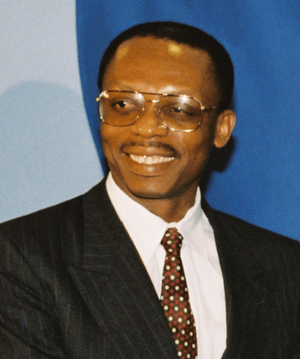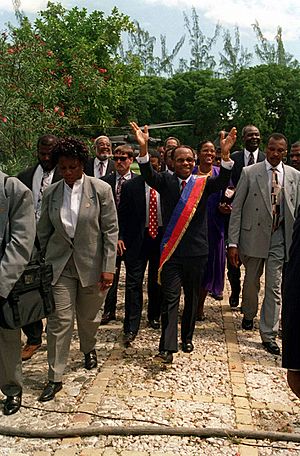Jean-Bertrand Aristide facts for kids
Quick facts for kids
Jean-Bertrand Aristide
|
|||||||||
|---|---|---|---|---|---|---|---|---|---|

Jean-Bertrand Aristide in 1993
|
|||||||||
| President of Haiti | |||||||||
| In office 4 February 2001 – 29 February 2004 |
|||||||||
| Prime Minister | Jacques-Édouard Alexis Jean Marie Chérestal Yvon Neptune |
||||||||
| Preceded by | René Préval | ||||||||
| Succeeded by | Boniface Alexandre | ||||||||
| In office 12 October 1994 – 7 February 1996 |
|||||||||
| Prime Minister | Smarck Michel Claudette Werleigh |
||||||||
| Preceded by | Émile Jonassaint | ||||||||
| Succeeded by | René Préval | ||||||||
| In office 7 February 1991 – 29 September 1991 |
|||||||||
| Prime Minister | René Préval | ||||||||
| Preceded by | Ertha Pascal-Trouillot | ||||||||
| Succeeded by | Raoul Cédras | ||||||||
| Leader of Fanmi Lavalas | |||||||||
| Assumed office 30 October 1996 |
|||||||||
| Preceded by | Position established | ||||||||
| Personal details | |||||||||
| Born | 15 July 1953 Port-Salut, Sud, Haiti |
||||||||
| Political party | Lavalas Political Organization (1991–96) Fanmi Lavalas (1996–present) |
||||||||
| Spouse |
Mildred Trouillot
(m. 1996) |
||||||||
| Children | 2 daughters | ||||||||
| Alma mater | Collège Notre-Dame State University of Haiti University of South Africa |
||||||||
| Occupation | Priest | ||||||||
|
|||||||||
Jean-Bertrand Aristide (born July 15, 1953) is a Haitian politician and former priest. He made history as Haiti's first democratically elected president. As a priest, he was known for teaching liberation theology, a belief that the church should help the poor fight for fairness.
Aristide won the presidential election in 1990 but was removed from power just months later in a military coup d'état (a sudden, often violent, takeover of the government). With help from the United States, he returned to serve as president again from 1994 to 1996. He was elected for a second term in 2001.
In 2004, Aristide was forced out of power again in another coup. He said he was kidnapped, and some officials from France and Haiti later said that France and the U.S. pressured him to leave. After this, he lived in exile in Africa for seven years before returning to Haiti in 2011.
Contents
Early Life and Becoming a Priest
Jean-Bertrand Aristide was born into a poor family in Port-Salut, Haiti, on July 15, 1953. His father passed away when he was a baby. He and his mother moved to the capital city, Port-au-Prince. At age five, he began his education with priests from the Salesian order.
He was a good student and after graduating, he studied to become a priest. He traveled to different countries in Europe for his studies. In 1982, he was ordained as a Salesian priest and began working in a church in Port-au-Prince.
A Voice for the People
For many years, Haiti was ruled by the Duvalier family dictatorship. Aristide saw how much poor people in Haiti suffered. He became a strong critic of the government and spoke out against the unfairness. He was a supporter of liberation theology, which teaches that faith should inspire people to work for a just society.
Aristide became a very popular figure, especially among the poor. In 1986, he started an orphanage called Lafanmi Selavi (Family is Life) for street children. Because he spoke out, he became a target. He survived several attempts on his life. In one famous incident in 1988, his church was attacked and burned down while he was giving a service.
His political activities caused problems with his Salesian order, and he was eventually expelled. Aristide said, "The crime of which I stand accused is the crime of preaching food for all men and women." In 1994, he left the priesthood. He married Mildred Trouillot in 1996, and they have two daughters.
First Time as President (1991–1996)
After years of difficult rule, Haiti held an election in 1990. Aristide ran for president and won with 67% of the vote. Many people saw this as the first truly fair election in Haiti's history. His followers were known as "Lavalas," which means "the flood" in Kreyòl.
During his first months as president, Aristide tried to make big changes. He wanted to bring the army under the control of the government and investigate past human rights abuses. These changes upset some powerful people in Haiti's business and military groups.
The 1991 Coup d'État
In September 1991, after only eight months in office, the army, led by General Raoul Cédras, overthrew Aristide. He was forced into exile, living first in Venezuela and then the United States. His life was saved with the help of American, French, and Venezuelan diplomats.
While he was in exile, the United Nations placed a trade embargo on Haiti. This was meant to pressure the military leaders to step down, but it also hurt Haiti's economy.
Return to Power in 1994
Many people around the world, including Haitians living in the U.S., protested and called for Aristide's return. In 1994, the United States, under President Bill Clinton, sent troops to Haiti in Operation Uphold Democracy. This pressure caused the military leaders to step down.
On October 15, 1994, Aristide returned to Haiti to finish his presidential term. His return was celebrated by huge crowds of supporters.
A Time of Opposition (1996–2001)
In 1996, Aristide started a new political party called Fanmi Lavalas. His old party changed its name but remained a separate group.
Fanmi Lavalas won the legislative elections in May 2000. However, some other political parties disagreed with how a few of the Senate seats were decided. Because of this disagreement, most opposition parties decided not to participate in the presidential election later that year. Aristide won the 2000 presidential election easily, but the controversy over the earlier election led some countries, including the U.S., to limit aid to Haiti's government.
Second Term and 2004 Overthrow
Aristide began his second term as president in 2001. During this time, he famously asked France to pay Haiti $21 billion. This was for the money Haiti was forced to pay France in the 1800s after winning its independence.
By early 2004, armed groups began to fight against his government. These rebels took control of the northern part of the country and moved toward the capital.
On February 28, 2004, Aristide left the country on a U.S. plane. The circumstances of his departure are disputed. Aristide and his wife said they were forced to leave in a "modern kidnapping" by U.S. forces. However, some U.S. officials and Haitian staff said he left willingly to avoid more violence. After he left, a new government was put in place.
Exile and Return to Haiti
Aristide was flown to the Central African Republic and then to South Africa, where he lived in exile for seven years. While in South Africa, he was a research fellow at the University of South Africa and earned a doctorate in African languages.
Many of his supporters in Haiti continued to call for his return. On March 18, 2011, Aristide and his wife flew back to Haiti. Thousands of people gathered at the airport to welcome him home. He told the crowd that he wanted to help his country move from "social exclusion to inclusion."
Life After Exile (2011–Present)
Since returning to Haiti in 2011, Aristide has mostly stayed out of politics. He has focused on education and community work.
In 2016, he became more active again by supporting candidates from his Fanmi Lavalas party during an election. However, voter turnout was very low, and other political groups won power.
What Did Aristide Accomplish as President?
During his time in office, President Aristide's government worked on many reforms to help the people of Haiti.
Education and Health Care
- Schools: The Lavalas governments built 195 new primary schools and 104 new high schools. Before 1990, there were only 34 high schools in the whole country.
- Literacy: The government started programs that helped about 300,000 adults learn to read and write.
- Health: With help from Cuba, his government worked to improve health care, especially in rural areas. They also started a successful program to prevent and treat AIDS.
Security and Human Rights
- Disbanding the Army: Aristide's government disbanded Haiti's army, which had often been involved in overthrowing governments and harming citizens.
- Justice: His government held trials for members of paramilitary groups who had been involved in past violence against civilians.
- Wages: He doubled the minimum wage to help low-paid workers.
Aristide's Views
Aristide has always been a strong voice for the poor. In his book, The Eyes of the Heart, he criticized global organizations like the World Bank for policies that he felt helped rich nations more than poor ones. He called for "a culture of global solidarity" to end poverty.
He believed it was his duty as a Christian to fight against the social injustice he saw in Haiti. He saw the world as a "class struggle" between the rich and the poor. While some called his ideas communist, Aristide said his beliefs were inspired by the Gospel and Catholic teachings, not by Marxism.
See also
 In Spanish: Jean-Bertrand Aristide para niños
In Spanish: Jean-Bertrand Aristide para niños
 | Stephanie Wilson |
 | Charles Bolden |
 | Ronald McNair |
 | Frederick D. Gregory |


